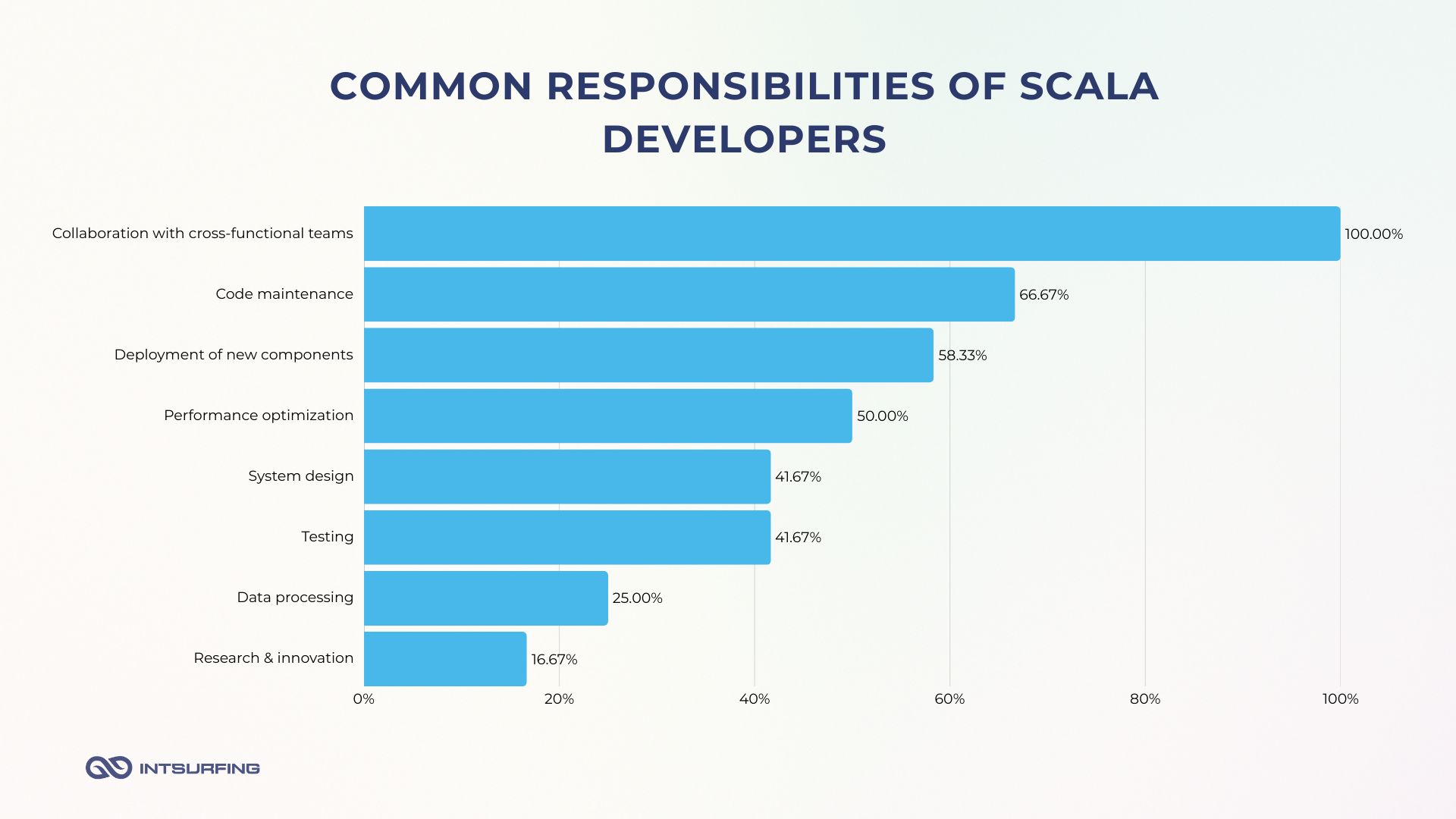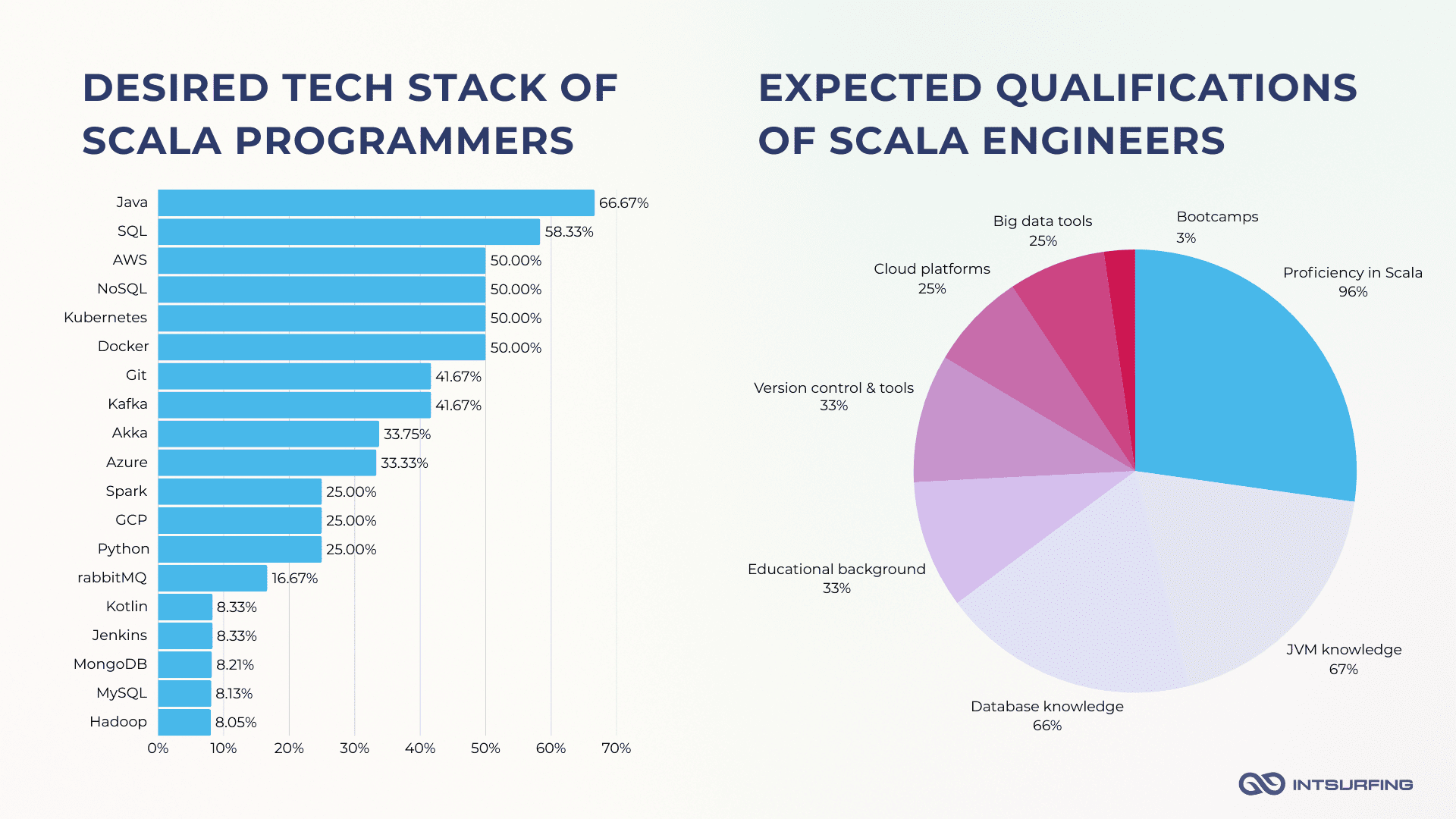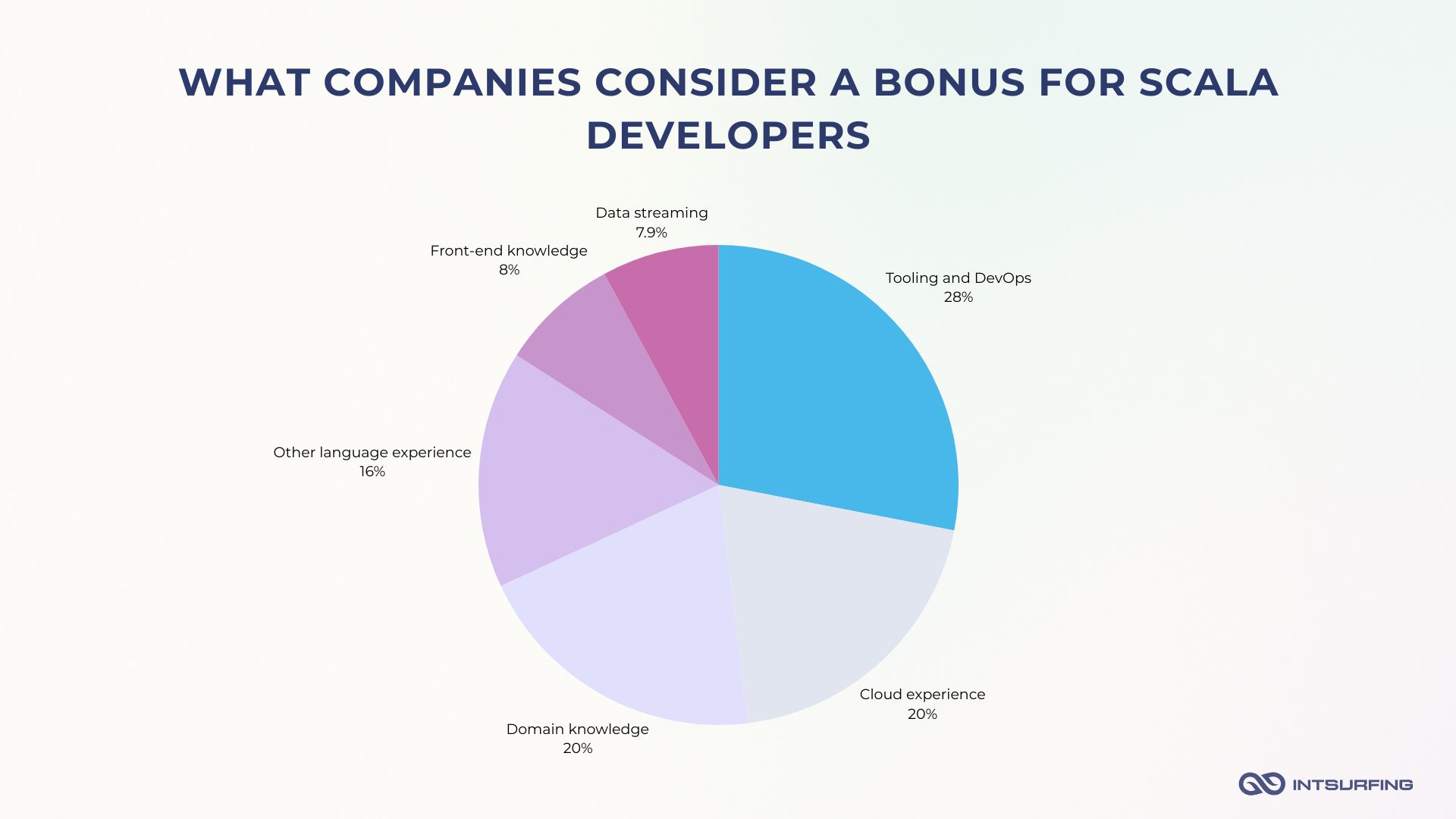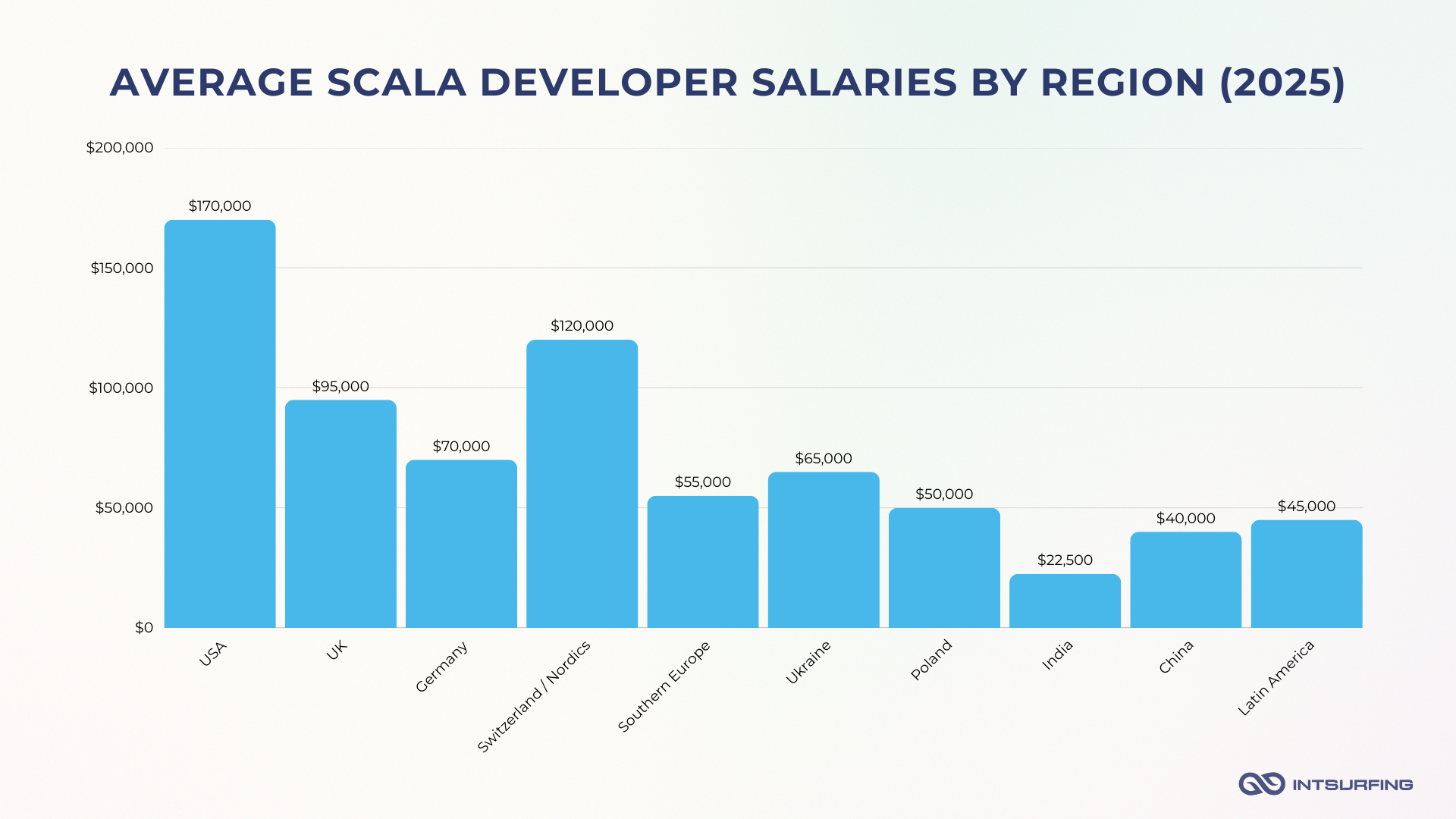Scala has become a go-to language for data engineering. It blends object-oriented flexibility with functional capabilities, making it ideal for scalable, high-performance data pipelines.
As the backbone of Spark, Kafka, and Akka, it’s already a key player in real-time and distributed processing. (If it’s not yet on your radar, here’s why use Scala for big data).
But hiring skilled Scala developers is tough. The talent pool is small compared to more popular languages. And Scala’s functional style comes with a steep learning curve, demanding deep knowledge of immutability, type safety, and abstraction that many developers haven’t mastered.
In this guide, we’ll walk you through everything you need to hire effectively—from core skills and sourcing strategies to assessments and interviews. By the end, you’ll know how to build a team that can tackle complex data pipelines with confidence.
Understanding the Role of a Scala Developer
A role of Scala developer in big data blends data engineering, distributed systems, and functional programming—with a focus on building systems that move, transform, and analyze massive data volumes.
Typical tasks include designing and optimizing pipelines, working with Apache Spark, and integrating Kafka or Akka. Unlike general backend roles, data engineer Scala positions often demand strong FP fundamentals to ensure reliability under concurrency. And if you’re interested in learning what Scala features Intsurfing loves and uses daily, there is an article dedicated to this topic.
Job listings on DOU, Djinni, and ScalaJobs show that software engineer Scala roles frequently involve ownership of both logic and architecture—from stateless service design and schema versioning to distributed job orchestration. Many Scala engineer jobs also mention code reviews, mentoring, and contributions to shared tooling.
Next, we’ll break down what companies expect from Scala developers—across responsibilities, qualifications, and tooling.
Common Responsibilities of Scala Developers
In most Scala engineer jobs, the role goes far beyond writing code. These engineers help shape data workflows and deliver production-grade systems for large-scale processing. Here’s what the job typically includes—in priority order:
- Cross-functional collaboration. Scala developers work with devOps, product teams, and other experts to ensure data systems align with business goals and fit the entire product infrastructure.
- System maintenance and evolution. Clean, modular, and scalable codebases are a must. For a Scala software engineer big data role, that includes framework upgrades, Scala version migrations, and performance-driven refactoring.
- Deploying new components. From Spark jobs to Akka services, developers handle releases using Docker, CI/CD pipelines, and monitoring tools (Prometheus or Grafana).
- Performance optimization. Engineers work on Spark DAGs, GC efficiency, and stream backpressure—balancing stability with speed.
- Architectural contributions. Mid- and senior-level engineers design data flows, define system boundaries, and choose libraries—e.g., Cats for abstractions or ZIO for async workflows.
- Testing and QA. Writing unit, integration, and property-based tests is routine. Experience with ScalaTest, Specs2, and test automation is expected.
- Data handling. Many roles involve ingestion, transformation, and validation—especially with Spark or Kafka in streaming or batch contexts.
- Exploration and prototyping. Some teams value R&D: trying new libraries, testing serialization formats, or benchmarking architectures.

Expected Qualifications
When companies set out to hire Scala developers, one thing is clear: Scala itself is non-negotiable. Nearly every job listing—96% of them—names proficiency in Scala as a core requirement. Even for junior roles, where some leniency might be expected, most companies still want candidates who at least have exposure to Scala, often paired with a degree in computer science or a related field.
That said, the expectations don’t stop at just knowing the language.
Two-thirds of the listings also call for solid JVM knowledge. This isn’t surprising—Scala runs on the JVM, so understanding how it works makes a real difference in writing efficient and maintainable code. Similarly, database knowledge is just as commonly expected. Employers want developers who can interact with both SQL and NoSQL databases.
About a third of job posts emphasize the importance of a strong educational background. This doesn’t always mean a diploma, but rather the foundational knowledge that often comes with one—like data structures, algorithms, and systems design. The same portion of listings—roughly 33%—mentions familiarity with version control systems (e.g., Git), along with build and dependency tools (e.g., SBT or Maven).
Cloud platforms and big data tools each come up in about a quarter of the listings. While not always mandatory, experience with AWS, GCP, Spark, Kafka, or similar platforms can tip the scales in a candidate’s favor.
And finally, a smaller share—just over 8%—points to DevOps skills and CI/CD knowledge. It’s not a must-have for every role, but as teams move toward more integrated, automated workflows, it’s definitely a plus.

Tools and Technologies
Most companies want engineers who understand the full stack behind production systems.
Java remains one of the most in-demand skills. Employers are looking for developers who can jump between Scala and Java when needed, especially in environments with legacy systems.
SQL is also high on the list, as most data projects require working with structured data. On the cloud side, AWS leads the pack, but Azure and GCP show up too. NoSQL databases are just as prominent, which reflects the need to handle semi-structured or unstructured data in data platforms.
On the infrastructure and data pipeline side, Kubernetes and Docker show up frequently, especially for companies running microservices or managing distributed systems. Git is a baseline requirement for version control, while Kafka and Akka are strong indicators of real-time or event-driven architecture.
Spark, although a bit less common than you might expect, still matters in roles focused on big data processing. Python, RabbitMQ, Jenkins, and Kotlin appear in a smaller number of listings—often as complementary skills rather than core requirements.
What Companies Consider a Bonus for Scala Developers
Many bonus skills actually overlap with core responsibilities. It shows how much a project needs to shape what companies expect from Scala devs.

DevOps and Tooling Experience
Experience with CI/CD pipelines (Jenkins, GitHub Actions), infrastructure as code tools (Terraform), and monitoring solutions (Prometheus or Grafana) is highly valuable for Scala teams. These skills are crucial for automating deployments, maintaining system reliability, and supporting the distributed nature of big data pipelines.
Cloud Fluency
Most Scala roles now expect hands-on experience with AWS, Google Cloud, or Azure. It’s not just about using EC2 or S3. What really matters is the ability to design fault-tolerant, cloud-native systems.
For example:
- Using AWS EMR to run Spark jobs
- Setting up auto-scaling for distributed apps
- Managing infrastructure as code with Terraform or CloudFormation
- Handling message queues with Amazon SQS or Google Pub/Sub
- Deploying microservices with Kubernetes or Fargate
If you’re fluent in both Scala and the cloud, you’re way ahead of the curve.
Domain Knowledge
Domain expertise helps Scala developers contribute faster and reduce errors. It matters when:
- Industry is regulated or high-risk. In fintech, healthcare, or logistics, mistakes can be costly.
- Data reflects real-world events. Domain familiarity improves decisions and reduces back-and-forth.
- You need fast onboarding. Prior experience cuts ramp-up time and improves team communication.
- Requirements are sensitive. Misunderstanding business logic can lead to compliance or data issues.
It’s not always required, but when it is, it saves time and prevents failure.
Other Language Experience
Scala developers often work in polyglot environments alongside Java, Python, or Kotlin.
Java is common in legacy systems or mixed stacks, making it valuable for long-term maintainability. Python shows up in data science or scripting workflows, especially in analytics-heavy teams.
Developers who can read and contribute to multiple codebases bring more flexibility to cross-functional teams. Language versatility helps teams bridge gaps between services, legacy code, and modern pipelines.
Front-End Awareness
Occasionally, companies look for Scala devs with basic front-end knowledge—usually in smaller or full-stack teams. It’s less about building UIs and more about designing APIs that are intuitive and efficient for end users.
Familiarity with React or TypeScript frameworks helps developers understand how data flows into the user interface.
This awareness leads to cleaner service design, better collaboration, and fewer frontend/backend mismatches. Not essential, but useful when tight team integration is part of the workflow.
Data Streaming Expertise
Experience with real-time data systems (e.g., Kafka Streams, Flink, Akka Streams) is increasingly valuable. These tools are common in event-driven and low-latency architectures.
Even if not explicitly listed, streaming know-how is a competitive edge in fast-moving, high-throughput environments. It signals readiness for the kind of systems where delays and failures aren’t tolerated.
How to Write a Job Description That Attracts the Right Talent
If you’re hiring Scala engineers for data pipelines, your job description should do more than list requirements. It must filter out mismatches, target the right seniority, and reflect your actual stack and culture.
Here’s how to write a job post that speaks to the right people:
- Be specific about Scala. Say if you use Cats, ZIO, or Spark. Don’t just say “Scala” — that attracts everyone and no one.
- Mention the data challenges. Large-scale ingestion? Streaming? Fault tolerance? State it up front.
- Call out your stack. If you’re using Kafka, AWS, and Kubernetes—say so.
- Clarify seniority. Don’t list 7 tools and call it a “junior” role.
- List what’s flexible. Remote, time zones, FP expertise — clarify where you’ll train and where you won’t.
- Keep it human. Say something about the team, how you work, or what success looks like in 90 days.
Example: Job Description Snippet
📣 Senior Scala Engineer — Data Platform & Streaming
Remote | EU-friendly timezone | Full-time
We’re scaling a modern data platform to handle high-volume batch processing. We’re looking for an engineer with production-grade Scala experience—someone who thinks in types, writes clean code, and ships systems that stay up.
You’ll join a small, pragmatic team—and help evolve pipelines built on Spark, Kafka, and ZIO.
What You’ll Do
- Build and maintain data pipelines using Spark, Kafka Streams, and Akka Streams
- Write testable, production-ready Scala with Cats, ZIO, or tagless-final style
- Deploy and monitor services on AWS, Kubernetes, EMR, and Prometheus
- Drive architecture, shape system design, and own performance-critical code
- Work async-first, collaborate closely with product and platform teams
You’re a great fit if you
- Use Scala confidently in production (not just in side projects)
- Know when to use typeclasses—and when not to
- Understand FP patterns without overengineering
- Can profile, tune, and reason about JVM behavior (GC, threads, heap)
- Have worked with streaming or batch data systems at scale
- Are familiar with sbt, GitHub Actions, and containerized deployments
Bonus Points
- Experience with ZIO, Flink, or Akka Streams
- Worked with data in regulated industries (finance, health, logistics)
- Contributed to OSS or mentored junior devs
- Comfortable navigating mixed Scala + Java environments
If this sounds like you—reach out.
Where to Find Skilled Scala Developers
If you’re hiring for a Scala engineer job, especially in data-heavy environments, you need to know where Scala developers actually spend their time — and how to reach the ones who match your stack and mindset. Below are the top sourcing channels, both in Ukraine and globally.
Ukrainian Platforms
- DOU.ua - The largest tech job board in Ukraine. Used by engineers of all levels, including strong senior Scala engineers.
- Djinni – Ukraine’s anonymous tech hiring platform. Popular among mid and senior engineers, many are open to remote work and international companies.
- CodeUA – A platform showcasing Ukrainian outstaffing and outsourcing companies that provide access to experienced tech professionals, including Scala developers.
Global Platforms and Communities
- ScalaJobs.com – A niche job board focused purely on Scala roles. A smart place to list if your team is hiring remote or hybrid.
- Stack Overflow Jobs – Trusted by engineers looking for real-world challenges. Use this to attract devs who care about code quality, architecture, and autonomy.
- LinkedIn – Still unmatched for reach. You’ll find strong Scala engineers, especially those not actively job-hunting. Boolean search and filters let you hone in on senior Scala engineer profiles or candidates with big data experience.
- Reddit – r/Scala – A technically savvy crowd. Monthly “Who’s Hiring?” threads are great for visibility within the Scala community.
- Scala Discord – The official Scala Discord includes a #jobs channel. It’s used by contributors, maintainers, and hands-on developers — a great space to build trust and connect informally.
Pro tip: Most strong candidates, especially for a senior Scala engineer job—don’t apply cold. Referrals, personal LinkedIn messages, and community engagement (Discord, meetups, GitHub) often outperform job boards.
Interview Process: From Resume to Final Offer
Once you’ve sourced strong candidates for a Scala engineer job, your interview process should reflect both the complexity of the role and the way your team works. If your pipeline is too lightweight, you’ll miss critical signals. If it’s too heavy, you’ll lose good people halfway through.
Here’s a lean but effective interview structure that works well for hiring senior engineers working with Scala, both in backend and data roles:
1. Resume and profile review
Look for hands-on experience with Scala in production. Real-world use of functional programming libraries (e.g. Cats, ZIO), JVM tuning, or working with Spark and Kafka is a strong signal. Multi-language experience (Java, Python) is often a plus in data-driven environments.
2. Intro call (30 minutes)
Use this call to assess fit: communication style, level of ownership, and motivation. Talk through the candidate’s most recent Scala-related project and listen for clarity, technical depth, and how they talk about trade-offs. This is also your chance to set expectations and explain your team’s challenges.
3. Technical interview (1–2 rounds)
This should focus on the core: Scala fundamentals, FP thinking, and real data problems. You don’t need to run whiteboard algorithm sessions, but you should ask them to reason through real code.
Pro tip: Include a short take-home or shared-coding exercise that reflects your actual stack—Spark, Akka Streams, Kafka, etc.
Want a deeper dive into what to ask at each stage? Check out “The Most Common Spark/Scala Interview Questions.”
4. Team interview or culture call
This round isn’t just a formality. Use it to understand how the candidates collaborate, give feedback, and handle ambiguity. Hiring for a senior role, pay attention to how they talk about mentoring, architecture decisions, and working across functions.
5. Final discussion & offer
Close the loop fast. The Scala market moves quickly—especially for developers with real streaming or performance experience. If someone clears your bar, don’t let them sit in limbo.
How Much Should You Pay a Scala Big Data Developer?
When hiring a Scala software engineer, expect to pay above-average salaries.
The numbers below come from our ongoing tracking of market trends, including salary data featured in our Scala market overview. They reflect real offers made to developers working with Scala in big data environments.

What Affects Scala Engineer Compensation
Several factors influence how much you’ll need to offer a Scala big data developer. If you’re evaluating a Scala software engineer salary, these are the variables that have the biggest impact:
Experience
- Junior engineers may start lower, but the gap grows fast.
- Engineers with 5+ years in Scala + big data command top-tier compensation.
- Look for hands-on impact: owning pipelines, designing architecture, or mentoring others.
Tech Stack
- Scala engineer salary often reflects the tools they’ve mastered.
- Airflow, Prometheus, or Terraform also push offers up.
- Developers with experience in Spark, Kafka, Flink, cloud platforms (AWS/GCP), functional libraries (Cats or ZIO) are generally in a higher bracket.
Location
- A senior Scala software engineer salary in the US may be 2–3x that of an equally skilled engineer in Eastern Europe.
- But top candidates—regardless of geography—know their market worth.
- If you’re hiring remotely, base your offer on role value, not just local market averages.
Tip: Define your must-haves early and align your budget accordingly. A strong offer saves time and reduces risk of losing great talent mid-pipeline.
Onboarding & Retaining Your Scala Talent
Hiring remote Scala developers is only the beginning. To ensure long-term success, especially when working with data engineer Scala professionals, it’s crucial to have a structured onboarding process and retention strategy.
- Structured Onboarding Plan: Develop a clear onboarding roadmap that outlines the first 30, 60, and 90 days. This helps new hires understand expectations and integrate smoothly into the team.
- Assign a Mentor or Buddy: Pairing new hires with experienced team members can accelerate learning and foster a sense of belonging.
- Provide Access to Necessary Tools: Ensure that developers have access to all required tools and documentation from day one. Tis includes code repositories, development environments, and communication platforms.
- Regular Check-ins and Feedback: Schedule regular meetings to provide feedback, address concerns, and discuss progress. This keeps communication lines open and helps in early identification of any issues.
- Encourage Continuous Learning: Offer opportunities for professional development, such as courses or workshops, to keep skills sharp and show investment in their growth.
- Recognize and Reward Contributions: Acknowledging achievements and providing incentives can boost morale and motivation.
Case Study: How Intsurfing Scaled to 6 Scala Engineers
Hiring Scala engineers isn’t like hiring for full-stack C# developer. It’s a niche market with fewer candidates, longer hiring cycles, and higher expectations on both sides. That’s something we at Intsurfing experienced firsthand and learned to navigate fast.
We spoke with Iryna Oliinyk, our team lead, about how she grew our Scala team from zero to six engineers across two hiring waves.
The Challenges
Scala software engineer positions don’t flood your inbox with CVs. Iryna highlights the main issues:
- Low candidate volume—there’s demand, but supply is tight.
- Drop-offs and no-shows—intro calls were scheduled, and no one showed.
- Skill mismatch—some candidates knew Scala, but not Spark.
- Communication gaps—candidates ghosted, or struggled with English.
- Mismanaged expectations—some spent weeks on a test task and got upset if not advanced.
What Helped Us Hire Better
Despite the bumps, Iryna says three things made a big difference:
- Clear, honest communication. “It works both ways. We try to be as transparent as possible about the process and what we expect.”
- Fast and respectful feedback. “Even if someone isn’t a fit, they deserve a clear and timely reply. That’s how you keep the talent market warm.”
- Staying personal. “Keep human contact throughout. A message or follow-up shows you care. That alone sets you apart.”
This case shows that even in a narrow talent market, it’s possible to scale a Scala data engineering team, if your hiring process is honest, responsive, and built on real human connection.
Conclusion
Hiring skilled Scala developers for big data projects is challenging, but entirely achievable with a well-structured approach. It starts with defining the role, aligning on the tech stack, and crafting job descriptions that resonate with qualified candidates. Thoughtful onboarding and timely feedback are key to retaining strong talent, especially in remote-first environments.
Whether you’re building data pipelines, scaling real-time systems, or looking for engineers to own performance-critical components, Scala offers a powerful foundation. Learn more about Scala development for big data and how it drives our work at Intsurfing.





